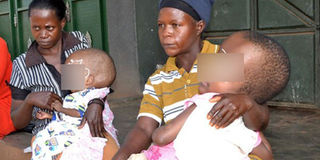Parents narrate hustle of caring for children with hydrocephalus

Affected. Parents with children suffering from hydrocephalus disease attend a children’s function in Nakaseke District recently. FILE PHOTO.
What you need to know:
- Doctors say about 60 per cent of hydrocephalus cases in Africa are due to infections [germs], others are caused as a result of head injuries and tumors, among others, yet sometimes hydrocephalus develops while the child is still in the uterus (mother’s womb).
- Ms Ruth Nalujja, the executive director of Spinabifida and Hydrocephalus Awareness Network - Uganda, an association of parents with children with hydrocephalus and spinabifida, says parents and society should understand that the disease is not a curse and it can be treated.
About two years ago, Ms Teddy Najjuuko, a resident of Namere Village in Wakiso District, gave birth to her first born, Jonathan Mayende, who was normal. Months later, doctors diagnosed him with hydrocephalus, a condition that makes the head grow oversize due to low absorption rates of water in the body.
“He used to sleep for many hours and I would have to force him to breastfeed. The normal head eventually started growing bigger,” Ms Najjuuko says.
“Doctors at Cure Hospital dragonised him with the condition but I had never heard of it. I did not know its signs and symptoms,” Ms Najjuuko adds.
She says her husband abandoned them upon realising that the child had been diagnosed with the condition.
“I could not stay with my husband’s parents because they thought it was my fault. I went back to my parents’ home where I live up to now. As if it is not traumatising enough, even most members of society have rejected my child. They call him names,” she says.
Doctors say about 60 per cent of hydrocephalus cases in Africa are due to infections [germs], others are caused as a result of head injuries and tumors, among others, yet sometimes hydrocephalus develops while the child is still in the uterus (mother’s womb). The cause is unknown
Dr Agatha Namutosi Wakama, a medical worker at Cure Children’s Hospital, says the fluids accumulate in the ventricles (chambers), compressing the brain thus damaging it.
A research conducted by Cure Hospital and conservative prevalence rates from National Institute of Health indicate that between 3,600 and 5,400 children in Uganda are born with or develop the condition every year.
Dr Wakama says: “Victims of hydrocephalus have increasing head size, poor feeding habits with failure to gain weight, suffer constant vomiting, severe headache in children and adults and irritability.”
When Sunday Monitor met the sick child, we could observe that the child was heavy in weight and could not talk, save for the communications using his eyes.
“I can know when he wants food and when he is in pain. For instance, when you ask him whether he is hungry, he will close his eyes in affirmative and opens them to negate,” she says.
Ms Najjuuko is not the only mother struggling to raise a child with hydrocephalus.
Ms Harriet Namusoke, a mother with a child suffering from the same condition, says she had to quit her job to take care of her child.
“Other parents think that if their children play with ours or even when they touch them, they will contract the condition, which is not the case. There is a lot of stigma that comes from the community. Some think it is some sort of a curse. They have no idea that we are dealing with ‘expensive’ children,” Ms Namusoke said.
Intervention
Ms Ruth Nalujja, the executive director of Spinabifida and Hydrocephalus Awareness Network - Uganda, an association of parents with children with hydrocephalus and spinabifida, says parents and society should understand that the disease is not a curse and it can be treated.
“They too have a right to privacy and should be respected,” Ms Nalujja says.
She advises that taking folic acid before giving birth prevents the risk by 70 per cent.
Dr Wakama says expectant women should give birth in the hospital not at home or small village clinics, and that they should avoid use of old razor blades to cut umbilical cord as it is a source of infections [germs].
“Do not put anything such as cow dung and lizard dung on the umbilical stump in an attempt to accelerate healing. Keep the baby in clean condition and wash your hands with soap before feeding/holding a new born baby [neonate] in an attempt to prevent infections. In case of a fever and or convulsions, seek immediate help from the hospital. Timely referral of the sick newborn,” she said.




